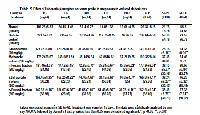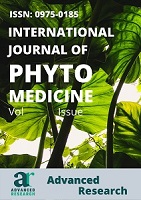Antidiabetic effect of various fractions of Habenaria plantaginea root in streptozotocininduced diabetic rats
Keywords:
Habenaria plantaginea, antidiabetic, streptozotocinAbstract
The aim of this study is to evaluate the antidiabetic effect of methanolic extract of Habenaria plantaginea and its various fractions in different animal models. The effect of repeated oral administration of methanolic extract along with its n-hexane, ethyl acetate and n-butanol fractions on serum lipid profile and plasma enzyme levels in diabetic rats was also examined. The effect was found to be pronounced in n-butanol fraction. In oral glucose tolerance test, reduction of fasting blood glucose levels took place from 60 min on administration of methanolic extract and its various fractions. The n-butanol fraction has almost similar effect as that of standard drug Glibenclamide (10 mg/kg b. w). After 15 days of treatment, n-butanol fraction showed maximum reduction of blood glucose levels (64.28 %). Total cholesterol (TC), triglyceride (TG), low density lipoprotein (LDL) and very low density lipoprotein (VLDL) levels were found to be decreased by 38.98, 28.06, 56.26 and 37.77% respectively in diabetic rats whereas, cardioprotective, high density lipoprotein (HDL) was increased by 31.65%. The n-butanol fraction also restored the altered plasma enzyme such as serum glutamic oxaloacetic transaminase (SGOT), serum glutamic pyruvic transaminase (SGPT) and alkaline phosphatase (ALP) levels to near normal. These results clearly indicate that n-butanol fraction of methanolic extract of Habenaria plantaginea possess high antidiabetic potential along with significant hypoglycaemic and hypolipidemic effects.
References
. Chandra A, Singh RK, Tewari L.
Antioxidative potential of herbal
hypoglycemic agents in diabetes-an
overview. SFRR-Indian Bulletin
;3:24–26.
. Kesari AN, Kesar S, Singh SK, Gupta
RK, Watal G. Studies on the glycemic
and lipidemic effect of Murraya koenigii
in experimental animals. J
Ethnopharmacol. 2007;112:305–311.
. Day C. Traditional plant treatment for
diabetes mellitus: pharmaceutical foods.
Britain J Nutri. 1998;80:5–6.
. Boyle JP, Honneycutt AA, Narayan KM,
Hoerger TJ, Geiss LS, Chen H,
Thompson TJ. Projections of diabetes
burden through 2050: impact of
changing demography and disease
prevalence in the US. Diabetes Care
;24:1936–1940.
. Zhang BB, Moller DE. News approaches
in the treatment of type 2 diabetes.
Current Opinion of Chemical Biology
;4:461–467.
. Dhanbal SP. Evaluation of therapeutic
activity and development of quality
control profiles for some antidiabetic
herbal drugs. Indian J Pharm Educ.
;8:163–165.
. Nadkarni KM, Nadkarni AK. The Indian
Materia Medica. Mumbai, India: Popular
Prakashan (Pvt.) Ltd.; 1996;p. 964-
:(vol 1)
. Maridass M, Zahir Hussain MI, Raju G.
Phytochemical Survey of Orchids in the
Tirunelveli Hills of South India.
Ethnobotanical Leaflets 2008;12:705-
. Mohammad HM. Therapeutic Orchids:
Traditional uses and recent advances –
An Overview. Fitoterapia 2011;82:102-
. Harborne JB. Phytochemical Methods.
London: Chapman & Hall; 1998;p.60.
. Ghosh MN. Fundamental of
Experimental Pharmacology. 3rd ed.
Kolkata: Hilton and Company;
;p.197.
. Theodorou NA, Vrbova H, Tyhurst M,
Howell SL. Management of intestinal
amoebiasis by an indigenous drug
Kantaki karanja (Caesalpinia crista L.).
Diabetol. 1980;18:313-318.
. Andallu B, Varadacharyulu NC. Control
of hyperglycemia and retardation of
cataract by mulberry (Morus indica L.)
leaves in streptozotocin diabetic rats.
Indian J Exp Biol. 2002;40:791-795.
. Kesari AN, Gupta RK, Singh SK,
Diwakar S, Watal G. Hypoglycemic and
antihyperglycemic activity of Aegle
marmelos seed extract in normal and
diabetic rats. J Ethnopharmacol.
;107:374–379.
. Shirwaikar A, Rajendran K, Barik, R.
Effect of aqueous bark extract of Garuga
pinnata Roxb. in streptozotocin–
nicotinamide induced type-II diabetes
mellitus. J Ethnopharmacol.
;107:285–290.
. Burkhardt RT, Batsakis JC. An
interlaboratory comparison of serum
total protein analysis. Am J Clin Pathol.
;70:508–510.
. Pierre NM, Demaekerl A, Marja H, Helga
TD, Henk B. Precipitation methods for
high density lipo-protein cholesterol
measurement compared, and final
evaluation under routine operating
conditions of a method with a low
sample-to-reagent ratio. Clin Chem.
;43:663–668.
. MeGown MW, Artiss JD, Strandberg
DR, Zak B. A peroxidase-coupled
method for the colorimetric
determination of serum triglycerides.
Clin Chem. 1983;29:538–542.
. Kind PRN, King EJ. Estimation of
plasma phosphatase by determination of
hydrolysed phenol with antipyrin. J Clin
Pathol.1954;7:322-331.
. Bailey CJ, Day C. Traditional plant
medicines as treatments for diabetes.
Diabetes Care 1989;12:553-564.
. Trivedi NA, Mazumdar B, Bhatt JD,
Hemavathi KG. Effect of Shilajit on blood
glucose and lipid profile in alloxan
induced diabetic rats. Indian J
Pharmacol. 2004;36:373-376.
. Hardy KJ, McNutty SJ. Oral
hypoglycemic agents. Med Digest
;23:5-9.
. Badole S, Patel N, Bodhankar S, Jain B,
Bhardwaj S. Antihyperglycemic activity
of aqueous extract of leaves of Cocculus
hirsutus (L.) Diels in alloxan-induced
diabetic mice. Indian J Pharmacol.
;38:49-53.
. Jacot E, Assal JPH. Regulation de la
glycemie. In: Pharmacologiedes
Concepts Fondamentaux aux
Applications Therapeutiques, editor
Schorderet. 1989;p. 481-494.
. Marles RJ, Farnsworth NR. Antidiabetic
plants and their active constituents.
Phytomedicine 1995;2:137–189.
. Ali L, Azad Khan AK, Mamun MIR,
Mosihuzzaman M, Nahar N, Alan MNE,
Rokeya B. Studies on the hypoglycemic
effects of fruits pulp, seed and whole
plant of Momordica charantia on
normaland diabetic model rats. Planta
Med. 1993;59:408–412.
. Kamanyi A, Dajmen D, Nkeh B.
Hypoglycemic properties of the aqueous
root extract of Morinda lucida (Rubiacea)
study in the mouse. Phytother Res.
;8:369–371.
. Foreston WC, Tedesco FJ, Starnes EC.
Marked elevation of serum transaminase
activity associated with extrahepatic
biliary tract disease. J Clin
Gastroenterol. 1985; 76:502–505.
. Hultcrantz R, Glaumann H, Lindberg G.
Liver investigation in 149 asymptomatic
patients with moderately elevated
activities of serum aminotransferases. J
Gastroenterol. 1996;21:109–113.
. Ohaeri OC. Effect of garlic oil on the
levels of various enzymes in the serum
and tissue of streptozotocin diabetic
rats. Bio sci Rep. 2001;21:19–24.
. Navarro CM, Montilla PM, Martin A,
Jimenez J, Utrilla PM. Free radicals
scavenger and antihepatotoxic activity of
Rosmarinus. Planta Med. 1993;59:312–
. Almdal TP, Vilstrup H. Strict insulin
treatment normalizes the organic
nitrogen contents and the capacity of
urea–N synthesis in experimental
diabetes in rats. Diabetologia
;31:114–118.
. Taskinen MR. Lipoprotein and
apoproteins in diabetes, in Current
Topics in Diabetes Research, editors.
Belfiore F, Bergnan RN, Molinatt GM,
Informa Health Care. 1993;p. 122–134.
. Wilson PWF. High density lipoprotein,
low density lipoprotein and coronary
heart disease. American J Cardiol.
;66:7A–10A.AbbreviationDM:
Diabetes mellitus
IAEC: Institutional Animal Ethical
Committee
OECD: Organization for Economic
Corporation and Development
ANOVA: Analysis of variance
i.p: Intraperitonial
min: Minutes
mg: Miligram
g: Gram
º C: Degree centigrade
h: Hour
OGTT: Oral glucose tolerance test
p.o: Per oral
STZ: Streptozotocin
WHO: WHO World health organization
TC: Total cholesterol
TG: Triglyceride
LDL: Low density lipoprotein
VLDL: Very low density lipoprotein
HDL: High density lipoprotein
SGOT: Serum glutamic oxaloacetic
transaminase
SGPT: Serum glutamic pyruvic
transaminase
ALP: Alkaline phosphatase



